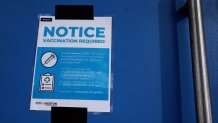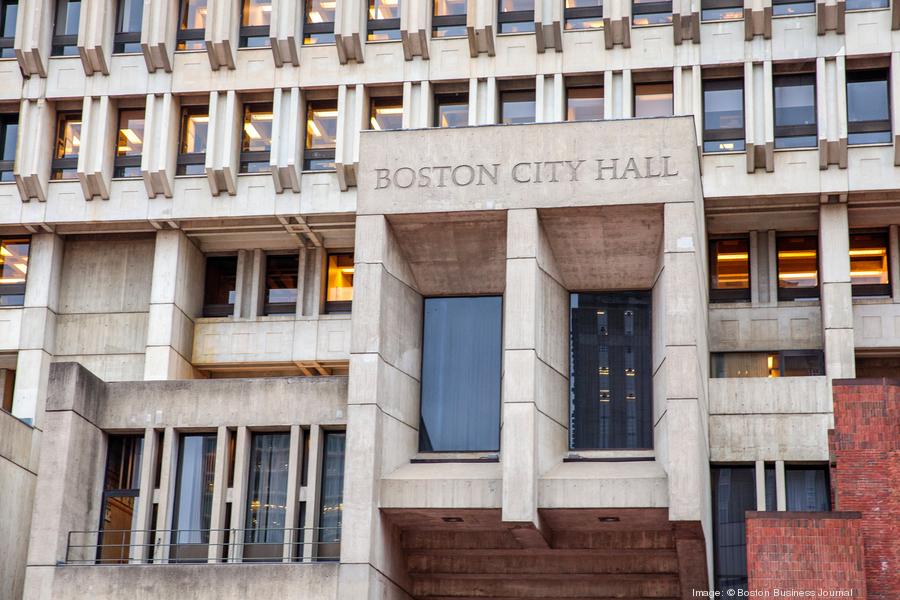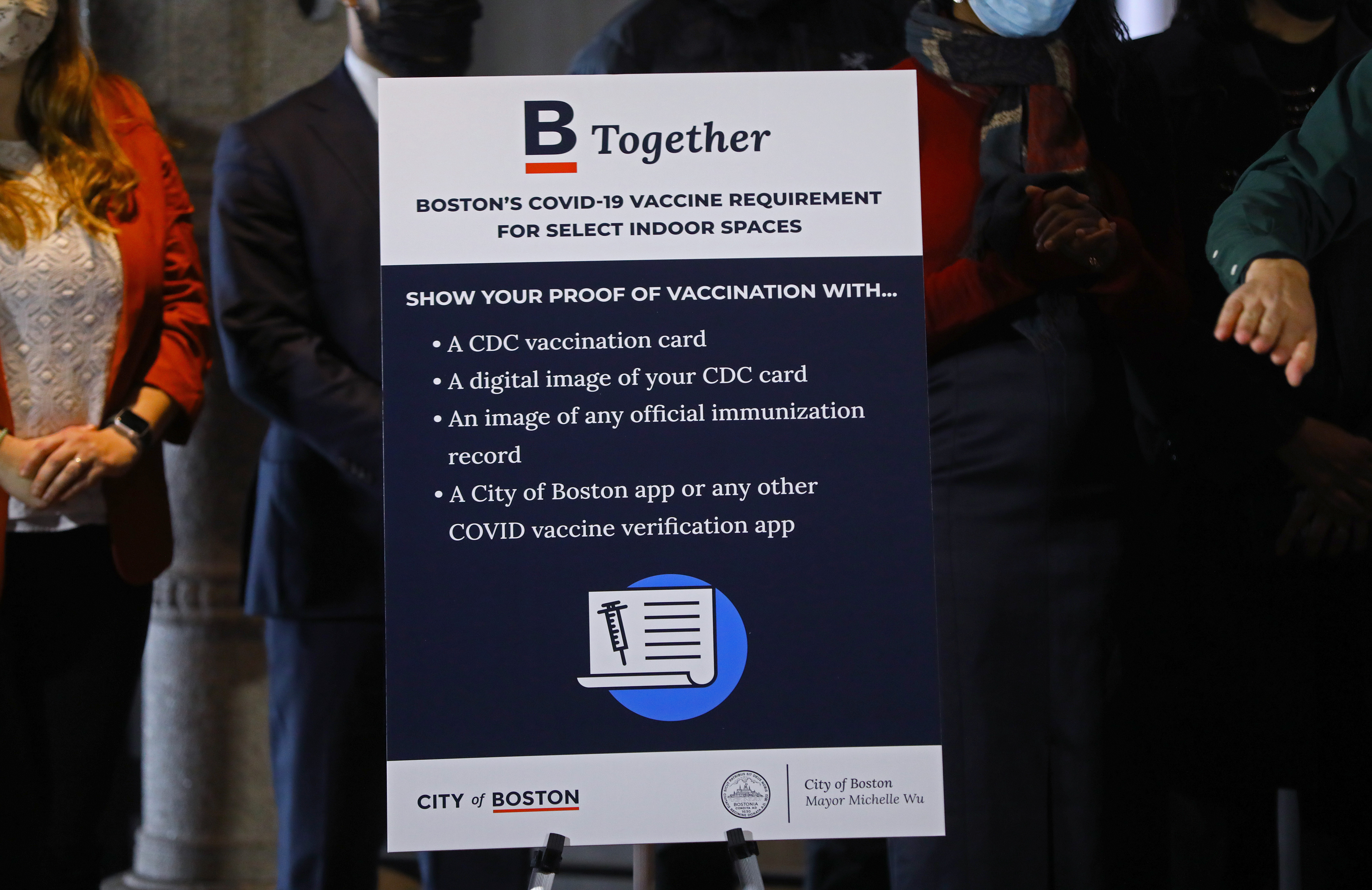The next phase of Boston's vaccine requirements took effect Tuesday even as COVID-19 cases and hospitalizations continue to decline in the city.
Mayor Michelle Wu announced in December that the vaccine mandate would begin on Jan. 15. Dubbed "B Together," the plan takes a phased approach to require proof of vaccination at indoor dining, fitness and entertainment locations. The requirements were put in place in the middle of Boston's omicron surge, which has shown signs of subsiding in recent weeks.
The goal is to get more people vaccinated.
"The fastest way for us to get through this pandemic is for us to continue getting vaccinated. Continue getting boosted," Wu has said.
But the two-shot requirement has stirred debate.
Under the first phase, anyone 12 or older — patrons as well as employees — must show proof of one dose of COVID-19 vaccine to enter certain indoor spaces in Boston, including indoor dining, fitness and entertainment establishments. The second phase, effective Tuesday, requires anyone age 12 or older to show proof that they have received at least two doses of COVID-19 vaccine.
Her plan also included a vaccination requirement for all city workers, which continues to be a sticking point with some city unions.

Individuals can demonstrate vaccination by showing their Centers for Disease Control and Prevention vaccination card or a photo of their card, any official immunization record or digital image from a pharmacy or health care provider, or on any COVID-19 vaccine verification app.
Businesses are required to post a notice at all entrances informing residents of the vaccine mandate.
The policy impacts events at the TD Garden, where the Beanpot championship hockey game was played Monday. Attendees had a wide range of opinions.
"Vaccines should be your choice, not the government's choice," argued John McCallister.
"You got to stay safe and keep your kids safe," said Ethan Valery, who was also attending the game.
"I think it would've made sense a year ago when [the virus] was a lot more intense, but now, I believe it's a little much," said Amelia Ballingall of the vaccine requirement.
Florida resident Bryan Burnelle knew of the vaccine requirement before coming to Boston. He doesn't mind the restrictions as long as he can have a way keep going to hockey games.
"I understand both view points, but if you want to go see some hockey, might as well just do it and take care of the people around us," said Burnelle.
Boston native Steve Flynn brought his kids, nieces and nephews to the game at the TD Garden. All of them are vaccinated, including his 9-year-old son. They all live in Saudi Arabia, where they say they are used to these sorts of restrictions.
"We fully support it," said Flynn of the B Together program. "We're going inside with 18,000 people. We need the kids in school tomorrow, we don't need them at home. So, being fully vaccinated with a mask, we'll do anything we can to keep our kids in school."
As expected, opinion on the mandate are mixed.
"I think it's fantastic. I think we should be doing everything we can to protect the youth of Boston so why not expand it to them," Boston resident Christopher Redmond said.
"It's stupid," Josh Truehart, of Brockton, countered. "You're vaccinated, you shouldn't be worried about getting the COVID. Wearing a mask. Shouldn't be worried about other people wearing masks. Get rid of the whole thing, Michelle Wu. It's stupid. Get rid of it. Get rid of it all."
That could happen sooner rather than later.
The city relies on three specific criteria in setting the mandates. Wu announced the benchmark metrics last week that city officials will look for to determine when to lift the city's vaccine requirements.
She said the proof of vaccination requirement will be lifted when the following occurs:
- Fewer than 95% of ICU beds are occupied
- Fewer than 200 COVID-19 hospitalizations per day
- A community positivity rate below 5%, as defined by the Boston Public Health Commission’s 7-day moving average
Wu said Tuesday that based on the latest data, the vaccine requirements could be lifted as early as this week.
"If the numbers continue along the trends we're seeing, we could see this policy lifted even in the next few days or so," she said. "We will cross that bridge if we come to it. We're seeing very good progress in terms of the metrics here."
As of Tuesday, Wu said the seven-day moving average was at 5.4%, the city was averaging 278 hospitalizations per day, and 90% of adult non-surge ICU beds were occupied.
"We're getting quite close to the threshholds announced," she said.
But the plan will stay in place and mandates would return if the numbers spike. And the mayor says epidemiologists she has talked to believe they will next fall and winter.
But even the experts say the science is not exact.
"No matter what you're talking about, whether its the threshold to wear masks indoors, whether its the threshold to open things, close things, have passports, not have passports, no matter what you're talking about, it would be completely arbitrary," Dr. Shira Doron, of Tufts Medical Center, said.
Despite that, Doron agreed with the mayor on vaccine passports as an incentive for people to get the shots.
More on Boston's vaccine mandate
Wu also said last week that Boston won't lift its school mask mandate on Feb. 28, which is the date that Gov. Charlie Baker announced the state will be lifting the statewide school mask mandate.
No date was given on when the mask mandate could be lifted in Boston schools, but the mayor said Tuesday that it will not be lifted at the same time as the vaccination requirements.
The Boston Public Health Commission would like to see additional trends ensureing we are on a downward trend across those three metrics," Wu said.



